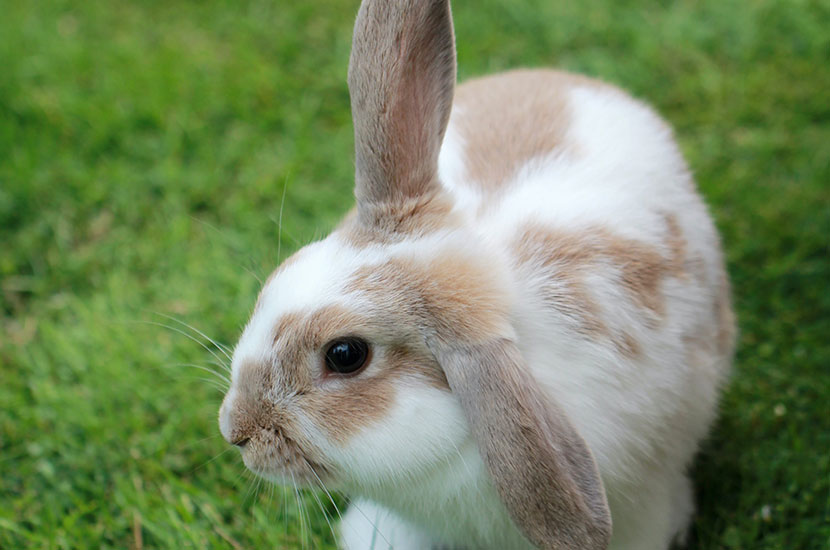by Dr. Maggie Wood
Photos and edited by Susan Horton, DVM
Skin parasites (ectoparasites)
The common rabbit fur mite is called Cheyletiella. This mite causes flaking, dryness, and thinning of the fur predominantly on the rabbit’s back. Therefore, it is sometimes referred to as “walking dandruff”.
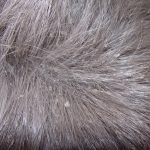
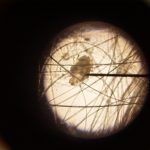
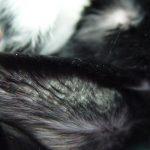
Rabbits can also get ear mites, which can cause inflammation, dark crusts, and itching of the ears. It is important to differentiate between a mite infestation and a bacterial or fungal infection since they can have similar symptoms. Mites can be diagnosed by taking samples to examine microscopically pictured below.
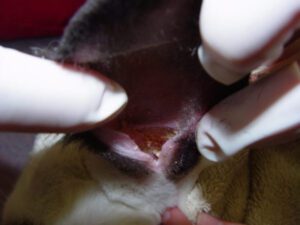
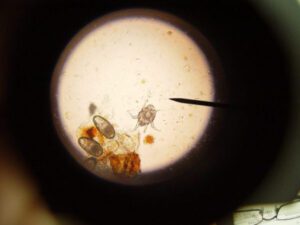
Rabbits are also susceptible to fleas, especially if they live in a household with dogs and cats. Usually the cat or dog is the one that brings the fleas into the household and perpetuates the flea infestation, so it is important to treat the cat or dog also. Many products sold for cats or dogs can be toxic for rabbits, so it is important to consult with a veterinarian to provide the correct flea treatment.
Flies can also lay eggs on rabbits that then develop into larvae. This is most common in rabbits housed outdoors, so it is recommended to keep your rabbit indoors to avoid this issue. There are 2 main types of larvae. The first type is called Cuterebra. These are quite large and only 1 larva is present at each site under the skin. They appear as a bump or swelling with a tiny “air hole” at the surface of the skin pictured below. These must be surgically removed. Never attempt to pull them out through the hole as this may cause a fatal anaphylactic reaction!
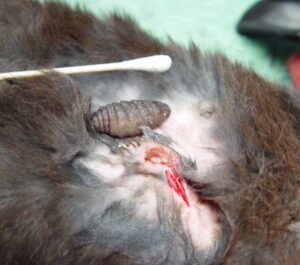
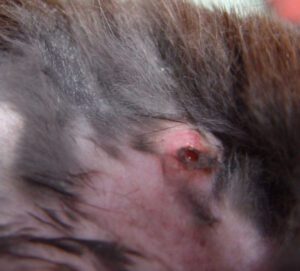
The other type of fly larvae are small maggots. These are most commonly found in rabbits that have a wound or skin infection, especially if the rabbit is debilitated or unable to groom himself properly. There are usually many maggots present in one spot and they will eat away at the rabbit’s skin if they are not removed promptly.
Parasites affecting nervous tissue ( brain, spinal cord, etc)
E. Cuniculi is a rabbit parasite that can infect the brain and other organs in the body. They are infected by oral ingestion of the microscopic parasite eggs found in the urine of affected rabbits. They can be chronically infected for quite a while before any symptoms are seen, which unfortunately makes it easier to spread from one rabbit to another. Neurologic signs may include a head tilt, circling, rolling or falling to one side, tremoring, weakness, and rapid eye movements. E. Cuniculi can also cause kidney problems, urinary incontinence, and eye problems such as cataracts and uveitis (inflammation of the eye).
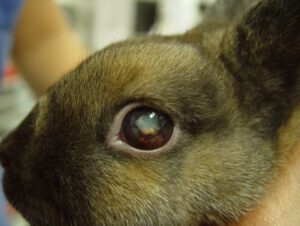
Rabbits that are housed outdoors and exposed to raccoon droppings can become infected with a raccoon parasite called Baylisascaris. It can migrate to their brain and cause neurologic symptoms similar to E. Cuniculi. It is best to prevent Baylisascaris by keeping your rabbit indoors, since it does not usually respond to medical treatment.
Bacterial infections of the inner ear can also cause similar neurologic symptoms to E. Cuniculi, so it is important to remember that not every rabbit with a head tilt or circling to one side has a parasite. They can respond to antibiotic therapy if it is caused by an ear infection.
Gastrointestinal Parasites (endoparasites)
Coccidia are the most common intestinal parasites of rabbits. Symptoms may include diarrhea and weight loss. Baby bunnies are more susceptible to coccidia, and they can become very sick and dehydrated. One type of coccidia can cause liver disease also. With an acute infection, this can cause severe illness due to liver dysfunction and obstruction of the bile ducts. With a more chronic infection, it can contribute to the development of tumors of the bile duct.
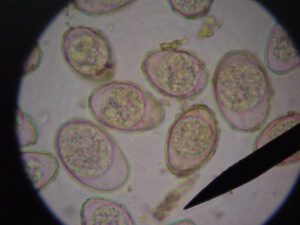
Rabbits can also get other parasites such as pinworms, tapeworms, and stomach worms. Not all rabbits with intestinal parasites show signs right away, so it is recommended to have a stool sample checked for any new rabbit that you bring into your household.
Since most parasites are contagious and are spread between rabbits, it is important to isolate affected rabbits until they are free of the parasite and determine if any other rabbits in the household have been exposed. It is also important to clean and disinfect the environment during treatment.
If you rabbit is showing any of these symptoms, please call us at (502) 241-4117 to make an appointment!

